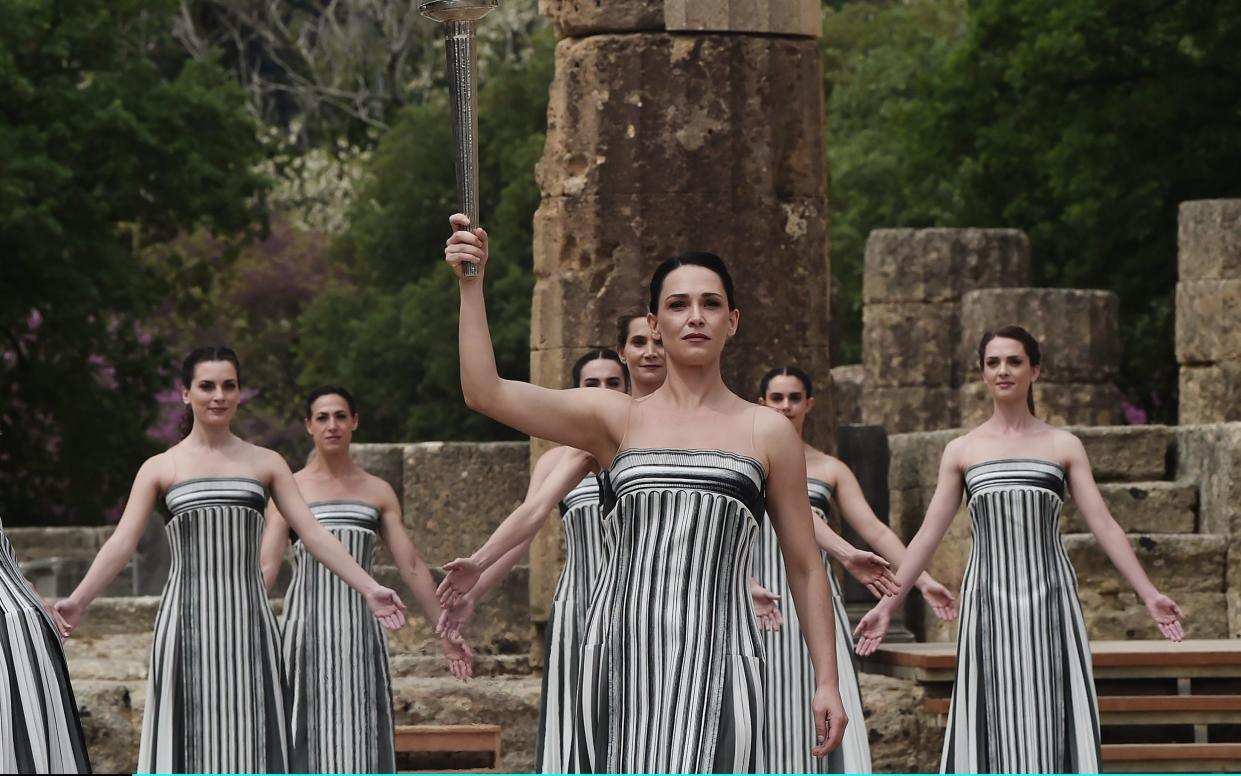The Olympic torch is burning. If only peace could catch on as easily

Did you spot the week’s most important speech, words spoken that should in fact be considered the most vital of the year?
Possibly not, what with all the bombing and biblical flooding. But from a field in southern Greece came the most salient voice of 2024, that of Thomas Bach, the president of the International Olympic Committee. A fencing champion from the 1976 Montreal event, he stood at the very spot where the Olympic Games were founded some 3,000 years ago and talked of the principles of the Games.
“In ancient times the Olympic Games brought together the great city states, in particular during times of war and conflict,” he said. “Today, the Olympic games are the only event that brings the entire world together in peaceful competitions.”
As the Greek high priestesses lit the torch at the ancient site of Olympia, on the Peloponnese peninsula, watched by officials and thousands gathered on the grassy slopes, Bach said that “the Olympic athletes are sending a powerful message: yes, it is possible to compete fiercely against each other and live peacefully together under one roof. With wars and conflict on the rise people are fed up with all the hate and aggression and negative news they are facing day in, day out. We are longing for something that brings us together, we are longing for something that will unify us.”
But was anyone listening to this sweet and cosy chat about peace? Of course not. While the besuited Bach mused about what could be, other suits, from Europe to Asia, Africa to the Middle East – those preening, hate-entrenched, revenge-obsessed, forgiveness-averse, overwhelmingly male brigade sat in their offices behind large tables – ordered drones and boys to do their dirty killing.
Far more interested in getting their tit in, before the next one gets in his tat, in time for their tit, and then another tat. That’s the kind of sport they revel in, their deadly ping-pong, whacking the ball back over the net regardless as to whether the world’s most powerful leaders have been urging restraint, to hit the net, to concede a point, for a better world.
Entrenched in bunkers of fury, convinced of their rightful place in history, desperate for justification regardless of calamitous consequence, they plough on. But they should pause and look at the principles of the Olympics, at what Bach is saying and at the example of the young athletes.
If only they could find it in their hearts to be stirred by the symbol of the Olympic torch. That relay has now begun and it will end in Paris on July 26. The torch will have to first cross the Mediterranean, a 10-day journey aboard the Belem, a historic, three-masted French ship, sailing from the Greek port of Piraeus, arriving in Marseille, God (sorry, Zeus) willing, on May 8, before it winds its way across France.
Then it’s all eyes on Paris. And how poignant is that? The city of love and of romance – and I speak with experience, having popped the question to a future wife one afternoon by the Pont Alexandre.
While we cheer on the athletes who represent our nations on the racetrack, in the pool, on BMX and with air pistol, I hope they can represent us as emissaries of amity.
The 2024 generation of athletes must set an example, and the likelihood is that ardour will break out in Paris. After all, previous experience dictates that the Olympic Village is one giant Club 18-30 holiday camp. Particularly amid the nervousness pre-match and then especially post-competition and demob happy, when 10,000 young, fit, toned, dedicated, ambitious, dreaming-of-glory youth gather. They’ll bond over shared experiences, console each other after failure, revel in success.
Bach says, “The athletes will show us what humans are capable of.” And that means one hell of a party. Or as one journalist I know, who covered the Olympics in Rio, put it: “It’s a shag-fest.”
So as romance breaks out in the Parisian Olympic village 2024, will the world’s warmongers learn from all these young people? As love breaks out in the Olympic village, can peace break out among the policymakers?
It is hugely satisfying for the soul to watch fiercely fought competition on the sports field, watching a tennis player come from a set down to win the match, or the perfect poise of a pool dive.
And the commentators always bring out the human stories for the spectators, the years of agonising training, the heartbreak of injury along the way and then the joy of victory or the misery of defeat.
My pliant heart will be captured and stirred as that torch makes its steady way to Paris and, like you, I’ll find myself absorbed by some random sport; the surfing or skateboarding and the language we’ll learn from the commentators (the fakies, flip tricks, grinds, nollies and bails) and yes, I’ll be arguing that when LA hosts in 2028 we need to see darts included.
How wonderful it would be if beautiful things happened in Paris and then an uncontrollable bug was unleashed upon the world; a pandemic of love.
But sadly history, or rather what is happening this very week, teaches us otherwise. The virtue of peace being far less tempting than the glorious slugfest that is war.
